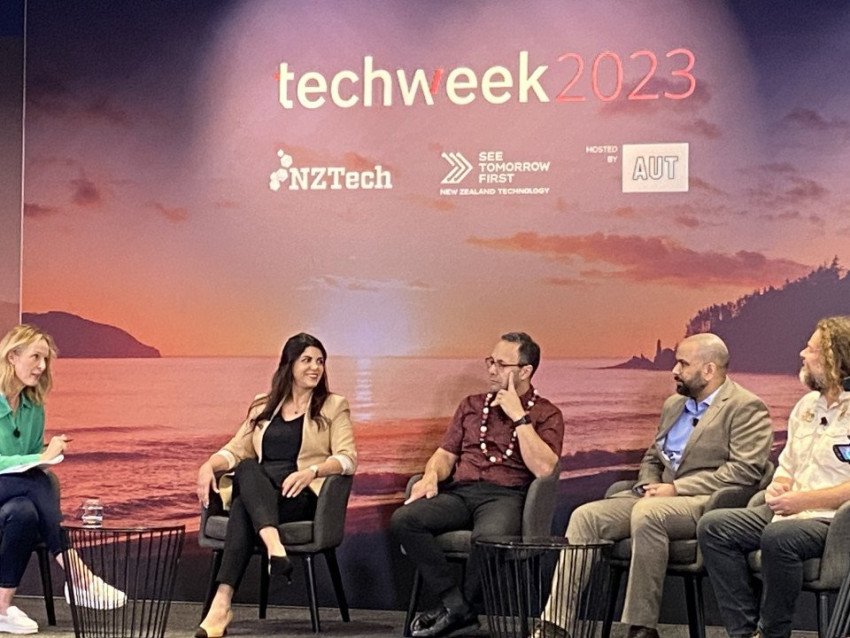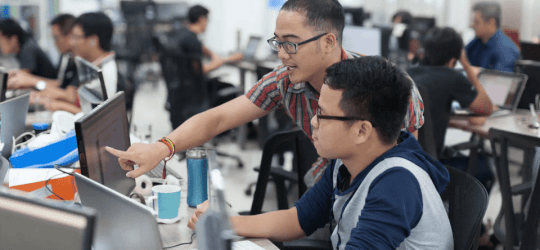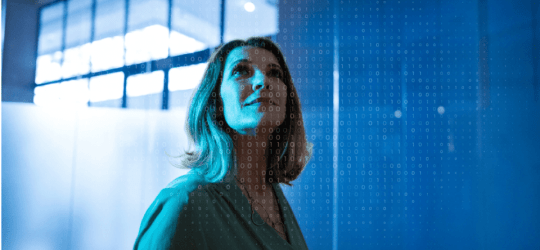Discover our nationwide festival for tech that's good for the world.
AI and Education
By AUT Team
26 May 2023

AI presents both opportunity and challenge for education sector
AUT’s Vice-Chancellor Professor Damon Salesa says the rapid growth of generative AI tools such as ChatGPT will have an enormous impact on the education sector, and that being at the forefront of that change is exciting.
“It’s such an exciting time to be thinking about AI, both as the leader of an educational institution but also as a teacher and as a researcher.
“We know education is about facing into the future, and technology often has its first frontier in learning and education.
“We also know there is something very significant about this moment – the way we use, apply and respond to AI will define the difference it makes in our world, whether that is a positive difference that includes lessening some of the inequalities that education has traditionally faced or whether a different outcome may come about. It’s a really important moment for us.”
AI will affect every aspect of our lives – even the way we tell our stories
“One of things that is notable about generative AI is the verisimilitude (the appearance of being true or real) of the technology. Users have an almost human-like experience. Even if this is an error, the familiarity of the output that makes us anthropomorphise (attribute human characteristics or behaviour) the technology is really part of its power but also part of its risk. That’s maximised when you’re talking about history.
“The ability of ChatGPT to do analytic work far faster than ordinary people, to write at a volume that is faster, while also not making clear what it means to be an author.
“The idea of authorship sits at the heart of truth and of our idea about what is factual. We associate particularly truth in history with the authority of a particular person. With generative AI aggregating data and running it through an algorithm we lose a sense of who actually wrote it and we lose the sense of who's responsible for it.
“The impact on history – the recounting of history – will be significant.
“We are going to have to answer these questions and remain very alert for ‘hallucinated’ content – the inaccurate, a bit wild or untrustworthy outputs of generative AI. We have this impression of AI being very human in its output, and thinking we have an intuitive understanding of it, when it is not intuitive and it's not a person. It's pushing against our own notions of what constitutes intelligence. Everything from that sense of intelligence to the sense of authorship is really being delivered to us in new ways to interrogate.
“These are classic questions of academic enterprise. They're not new in a sense but they're happening at speed.”
AI potentially a great tool for under-served communities
“As a scholar of the Pacific the opportunities afforded by generative AI are exciting. I look at how quickly Pacific communities have adopted new technologies in the past – look at Samoa becoming essentially the most literate community on earth within 20 years of having a written language – and see huge potential for the possibilities of AI.
“Previously underserved communities might be able to access the ability to tell stories more fairly, more quickly. The political economy of storytelling has often skewed against small cultures and small societies so there is potential to disrupt this pattern.”
AI is an issue for all levels of the education sector
“When I think about the schools who are educating students who’ll be joining us at AUT, I think this quandary about AI, and how to approach it within education is crucial. It’s an issue for all parts of the education sector.
“We have to step away from this kind of arms race mentality, where educators are bringing in AI detection tools to catch students using tools like ChatGPT.
“We know tools like ChatGPT offer advantages already. They can offer a level of patience that a student might not perceive in a teacher, to explain things again and again in an iterative way, which students might not feel comfortable asking a person to do.
“As educators, we must drive to the heart of what learning is, should be, and the difference it can make.
“We're trying to produce lifelong learners. We have to make sure that learners can keep learning and that means providing authentic learning experiences where students understand why they are doing something. If they're doing an assessment which makes no sense to them, and they don't understand the benefit it delivers to them in terms of their own thinking and their own learning, of course they're going to think about ways they can circumvent it.
“At AUT we particularly put a premium on embodied learning, on practice. Those are not things that AI is particularly helpful in subverting so if you get the right kinds of assessment that students themselves understand why they're learning and why they're pursuing a particular assessment then we get a both a better teaching practice and we get better learning outcomes.
“We know that AI is going to be here for good - or for worse - but it's not going away. There’s no imaginable future without it. We should be equipping students to know how use it, to understand what it is, to think about it ethically and how it would augment and support their own learning.
“We’re already embracing this opportunity at AUT to encourage our students to understand AI, to be supported in using it with integrity and to provide inspiring teaching in collaboration with students. I remain an optimist about the opportunities presented by AI in education.”
Watch Damon discuss AI and education with an AUT panel also featuring Senior Lecturer Dr Mahsa Mohaghegh, Associate Professor Dr Roopak Sinha and Learning Advisor Craig Wattam during Techweek 23.
Subscribe to the Techweek newsletter for updates straight to your inbox:
Recent news
Selling business solutions to Malaysia's ICT sector
29 Apr 2024
This article was originally posted by myNZTE.
What do tech buyers in Singapore want?
29 Apr 2024
This article was originally posted by myNZTE. Companies in Singapore don't tend to know much about New Zealand's tech offerings, but they are open to them.


